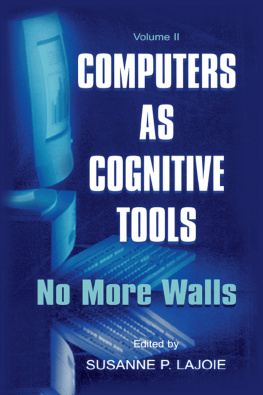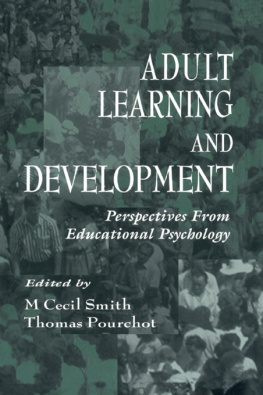
ROUTLEDGE LIBRARY EDITIONS:
PSYCHOLOGY OF EDUCATION
Volume 41
THE PSYCHOLOGY OF
EDUCATIONAL
TECHNOLOGY AND
INSTRUCTIONAL MEDIA
THE PSYCHOLOGY OF
EDUCATIONAL TECHNOLOGY
AND INSTRUCTIONAL MEDIA
KEN SPENCER

First published in 1988 by Routledge
This edition first published in 2018
by Routledge
2 Park Square, Milton Park, Abingdon, Oxon OX14 4RN
and by Routledge
711 Third Avenue, New York, NY 10017
Routledge is an imprint of the Taylor & Francis Group, an informa business
1988 Ken Spencer
All rights reserved. No part of this book may be reprinted or reproduced or utilised in any form or by any electronic, mechanical, or other means, now known or hereafter invented, including photocopying and recording, or in any information storage or retrieval system, without permission in writing from the publishers.
Trademark notice: Product or corporate names may be trademarks or registered trademarks, and are used only for identification and explanation without intent to infringe.
British Library Cataloguing in Publication Data
A catalogue record for this book is available from the British Library
ISBN: 978-1-138-24157-2 (Set)
ISBN: 978-1-315-10703-5 (Set) (ebk)
ISBN: 978-1-138-70975-1 (Volume 41) (hbk)
ISBN: 978-1-315-20083-5 (Volume 41) (ebk)
Publisher's Note
The publisher has gone to great lengths to ensure the quality of this reprint but points out that some imperfections in the original copies may be apparent.
Disclaimer
The publisher has made every effort to trace copyright holders and would welcome correspondence from those they have been unable to trace.
THE PSYCHOLOGY
OF EDUCATIONAL
TECHNOLOGY AND
INSTRUCTIONAL
MEDIA
KEN SPENCER
ROUTLEDGE
London and New York
CONTENTS
First published in 1988 by
Routledge
11 New Fetter Lane, London EC4P 4EE
Published in the USA by
Routledge
in association with Routledge, Chapman & Hall, Inc.
29 West 35th Street, New York NY 10001
1988 Ken Spencer
All rights reserved. No part of this book may be reprinted or reproduced or utilised in any form or by any electronic, mechanical or other means, now known or hereafter invented, including photocopying and recording, or in any information storage or retrieval system, without permission in writing from the publishers.
British Library Cataloguing in Publication Data
Spencer, Ken
The psychology of educational technology and instructional media.
1. Educational technology Psychological aspects
I. Title
371.3'07'8LB1028.3
ISBN 0-415-00567-1
Library of Congress Cataloging-in-Publication Data
ISBN 0-415-00567-1
Printed and bound in Great Britain by
Biddies Ltd, Guildford and King's Lynn
My thanks are due to the many colleagues and friends who have contributed, some unknowingly, to this book: especially Carol, Anna and Jane. Over the years I have received encouragement from Ann Clarke and inspiration from Janet Duffin, whose insights have promoted the educational rather than the instructional aspect of Educational Technology. The original idea for the book stemmed from a meeting sponsored by the Council for Educational Technology, and I am grateful to all members of CET who have worked so hard at promoting this field. I could not have developed the initial idea without the feedback from my students, and I thank all who have suffered during the past few years. Without the computer wizardry of Phil Wade I could not have met my deadlines: thanks, Phil! And, finally, special thanks to Derek Packham, who read the draft and provided many valuable comments and suggestions; however, the final responsibility for both content and treatment must remain entirely my own.
Educational technology is composed of at least two overlapping subsets: technology in education and technology of education. The tools-technology, sometimes known as the hardware approach to educational technology, but more commonly known under the title audio-visual aids or instructional media, may be thought of as technology in education. Whereas, the educational application of knowledge from the behavioural sciences, such as psychology, forms the basis of a technology of education.
Educational technology can be seen as an umbrella term for the application of scientific knowledge in the field of education. This covers considerable ground, as can be seen in , which identifies crucial disciplines which impinge on Hawkridge's (1981) concept of educational technology.
Jonassen (1985) has discussed the psycho-philosophical perspective of educational technology in this century, showing the various shifts in theoretical foundations and practices associated with four distinct phases: the physical science or instructional media movement, the behaviourist and neo-behaviourist movements, and finally the constructivist or cognitive science approach.
The physical science approach gained momentum early in the century as the audiovisual movement, focusing on the machines and materials, rather than the learner (Saettler, 1968). This approach was concerned with the effects of devices and procedures, which were seen as acting as an antidote to the excessive verbalism of traditional teaching methods (Wittich and Schuller, 1953). The new media were to supply a concrete basis for conceptual thinking, make learning more permanent, develop continuity of thought, the growth of meaning and efficiency, depth, and variety of learning (Dale, 1954). It yielded to the behaviourist approach following the training effort of World War 2, culminating in the systems approach to course design in the 1960's. In many ways this remains the corner-stone of educational technology. It was grounded historically in behaviourism and later developed by behavioural psychologists who explicitly excluded the study of mental processes, placing emphasis only on observable changes in behaviour. This aspect of educational technology is most obvious in the linear teaching machines devised by B.F. Skinner.
There has been a gradual reaction to this radical behaviourism resulting in what has been termed neo-behaviourism, which acknowledges that behaviour is all we can observe, but claims that the observed behaviour depends on mental processes. It is at this stage of evolution that educational technology is to be found in its present form, according to Jonassen.
Figure 1-1.Components of Educational Technology: Physical and behavioural sciences. (Based on Hilgard, 1964)
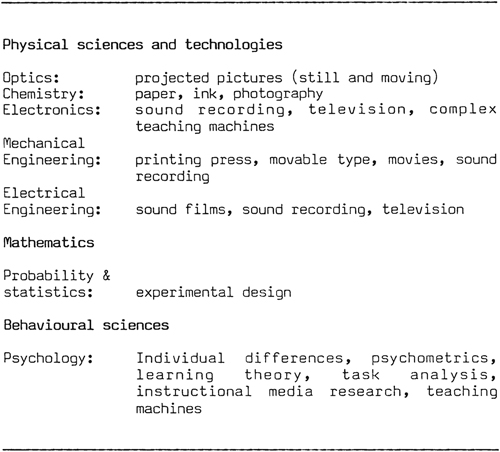
However, there has been a major revolution going on in psychology for several decades, which has replaced the mechanistic behaviourist model of human behaviour with the constructivist model. Here the individual is seen to select and interpret the raw materials of experience, which are ultimately transformed into different realities for different people. Piaget (1970) says that knowing reality is a process of constructing systems of transformations that model reality. This cognitive model of learning has largely replaced behaviourism and is now in the process of being assimilated into the technology of education. If this occurs to any great extent the goal of replication of behavioural responses will be replaced by the activation of covert mental processes required to build an appropriate cognitive model of reality within the learner.
Next page
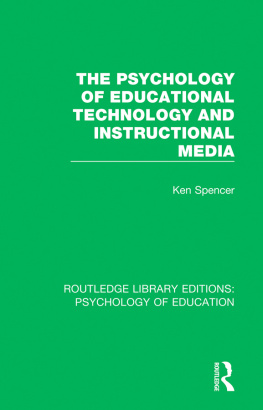
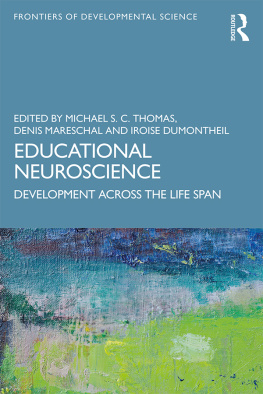

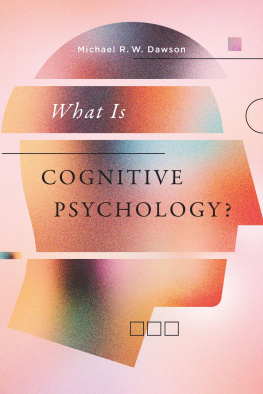
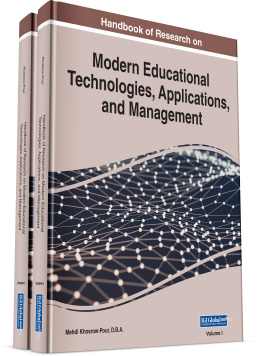

![Lajoie Susanne P(Editor) - Computers as cognitive tools. [1]](/uploads/posts/book/250179/thumbs/lajoie-susanne-p-editor-computers-as-cognitive.jpg)
